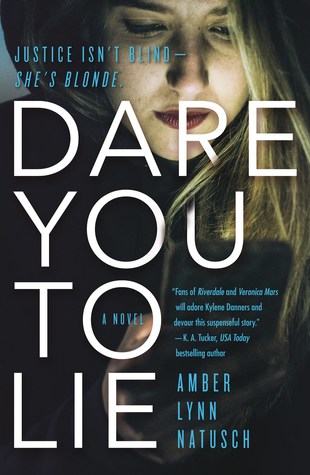I'm lucky (or cunning) enough to have lured yet another successful writer over to my blog for an SAT - Successful Author Talk. SAT authors have conquered the query, slain the synopsis and attained the pinnacle of published. How'd they do it? Let's ask 'em!
Today's guest for the SAT (Successful Author Talk) is Amber Lynn Natusch author of the bestselling Caged series for adults. Dare You to Lie is her debut YA novel with Tor Teen.
Are you a Planner or Pantster?
Pantser. Hands down. I couldn’t control my characters long enough to even begin plotting a story.
How long does it typically take you to write a novel, start to finish?
It’s taken as little as a month (with two young kids and a day job). It’s taken as long as a year. For me, it depends on the story and whether or not my characters are talking to me. Sometimes they bugger off 😉
Do you work on one project at a time, or are you a multi-tasker?
I try to but that generally doesn’t happen. At minimum, I’m writing one while editing another.
Did you have to overcome any fears that first time you sat down to write?
Nope. I was too ignorant to be afraid. If I knew then what I know now, I’m not sure I ever would have. Ignorance really CAN be bliss.
Have you ever quit on an ms, and how did you know it was time?
Never!!! I don’t do quitting. It’s a rule. I have had to completely overhaul novels before, but once I’m invested, there’s just no room for quitting.
Who is your agent and how did you get that "Yes!" out of them?
The amazing Jess Watterson from the Sandra Dijkstra Lit Agency is my agent. She reached out to me in 2013, and asked if we could discuss possibly working together. She’d read my women’s lit novel, Undertow, and loved it so much she knew she wanted to represent me, if I wanted to consider a traditional publishing career (which I did). It took about a year and an offer from another major agency before I decided on Jess. I just had a good feeling about her, and I’m a go-with-your-gut kinda girl. So far, it’s worked out.
Any advice to aspiring writers out there on conquering query hell?
Oof. I don’t have much other than to research successful queries, have others read and critique yours, and do your best to sell what’s unique and special about your story.
How much input do you have on cover art?
Little to none. With my self-published works I have full control, so giving that up was a STRUGGLE for me. Thankfully, I have an editor who tries to keep me happy and make me see the strategy behind certain things.
What's something you learned from the process that surprised you?
How everything moves fast until it doesn’t, then it slams into you like a freight train and doesn’t relent.
How much of your own marketing do you?
A LOT, but that’s the indie in me. I’m my own publishing house with a lot of my work, so I learned the value of grassroots marketing early on. It’s a huge reason why I was successful on my own. I think Instagram and Facebook are my favorites. I do still have a blog that I write on occasionally. My newsletter has also been a great way to reach fans. I shy away from videos—it’s really just better for everyone that I do.
When do you build your platform? After an agent? Or should you be working before?
I don’t know from personal experience, but I do know that friends of mine who debuted this year were working to build their platforms for quite a while. I think once agented is reasonable… possibly even before.
Do you think social media helps build your readership?
I do, though changes in algorithms can make it a challenge. I like to be conversational with my fans. I think that’s partially why I have a strong fan base.






